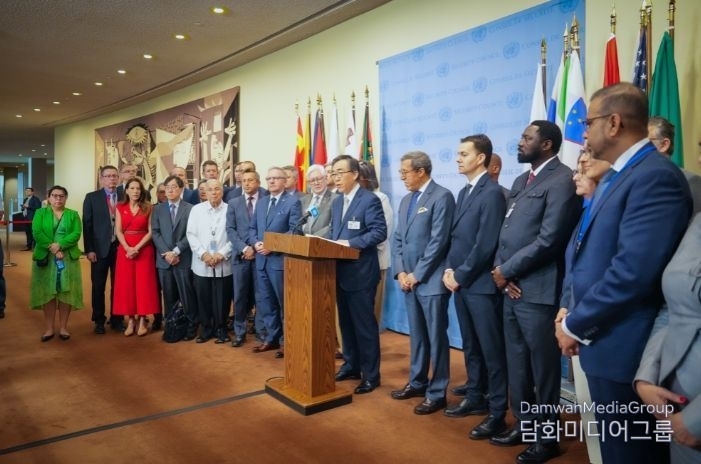By UN Journal Lee Kap-soo
Foreign Minister Cho Tae-yul, representing the Republic of Korea's presidency of the Security Council, chaired an open debate on "Threats in Cyberspace and the Security of International Peace" at the UN Security Council in New York on June 20.
The discussion, the first face-to-face meeting of the Security Council on cybersecurity, was attended by nearly 70 countries, including all 15 Security Council members, and featured UN Secretary-General António Guterres, Cyber Peace Institute CEO Stephane Duguin.

Prior to the open discussion, Minister Cho delivered a joint statement in front of the Security Council chamber with representatives from 63 countries and the EU, including South Korea, the United States, Japan, and other countries from various regions.
As the first joint statement on cybersecurity to be delivered at the Security Council, he pointed out that the development of weapons of mass destruction through illicit activities, such as cyberattacks on critical infrastructure and theft of virtual assets, is a direct threat to international peace and security, and emphasized that the Security Council must play a key role in countering cyber threats in order to fulfill its primary responsibility for maintaining international peace and security.
In response to a media question on the "Treaty on Comprehensive Partnership between Russia and North Korea," which followed the joint statement, Minister Cho emphasized that any direct or indirect assistance or cooperation that augments North Korea's military capabilities is a clear violation of UN Security Council resolutions, and expressed regret that the Permanent Members of the Council have acted in violation of the Security Council resolutions they agreed to adopt.
In his remarks, Cho assessed that the development of new technologies such as artificial intelligence may increase the disruption of cyberspace by malicious actors, and that physical wars are accompanied by cyberattacks, and that political processes such as elections and core infrastructure have become targets of malicious cyber activities, affecting the real world.
He cited North Korea's circumvention of sanctions and threats to the international nonproliferation regime through malicious cyber activities as a typical example of cyber threats faced by South Korea, and pointed out that a report by the recently suspended expert panel of the Security Council's North Korea Sanctions Committee analyzed that 40 percent of North Korea's weapons of mass destruction development is financed through illegal cyber activities.
As the body with primary responsibility for maintaining international peace and security under the U.N. Charter, the Security Council must strengthen its response to cyber threats, Cho said, and offered a concrete methodology for doing so.
First, he suggested that the Security Council clearly diagnose the current situation by hearing regular reports on cyber threats (diagnosis); second, consider cybersecurity as a key element in discussions on the Council's various agendas, including sanctions, nonproliferation, and terrorism (prescription); and third, exercise the Council's inherent powers, such as convening formal meetings in the medium to long term, to propose appropriate solutions to cyber threats (treatment).
He emphasized that a cyberspace free from malicious cyber threats would also contribute to the development of the digital economy and the protection of human rights.
UN Secretary-General António Guterres assessed that the Security Council can effectively respond to cyber threats by incorporating cybersecurity-related issues into its agenda, including civilian protection, peacekeeping, and counterterrorism, and said that the outcome document of the Future Summit, scheduled to be held in September, will reflect the protection of critical infrastructure and enhanced accountability for artificial intelligence and advanced technologies.
The United States, the United Kingdom, France, Japan, and other key Council members who participated in the open discussion cited North Korea's theft of virtual assets, ransomware attacks, and attacks on critical infrastructure as major cyber threats, and expressed their support for the UN General Assembly's adoption of the "Code of Conduct for Responsible States Parties in Cyberspace" and hoped that the Council would continue to explore ways to engage in cybersecurity.






